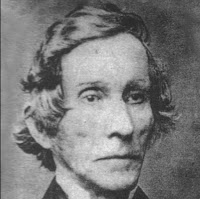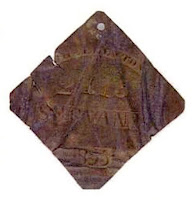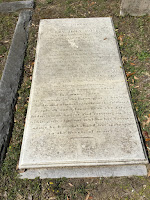 |
| Rev. John Mood green-wood.com |
Rev. John Mood. A name I have never heard before but just seeing
the picture of his silver cutlery got me excited right away! I had seen it so
many times before!
I see this kind of decoration on silverware called “French Thread Pattern” basically every day. In my home country Germany, it is a very
common type of flatware and can be found in many households and we have it at
our house as well!
 |
| Cutlery in French Thread Pattern Left: John Mood marks4antiques.com Right: From My Home |
Surprisingly, there actually is a connection between John
Mood and Germany as I found out on findagrave.com. His father Johan Peter Muth emigrated
from Germany Württemberg Westphalia in 1750. He was a silversmith and became
significant with his work in Charleston as well. Later, his two sons John Mood
and Peter Mood Jr. learning this craft from him and took over his business.
Under the name of Mood & Sons, John did not only sell
silverware but also created slave badges. I found this out reading a very
informative post about the Mood brothers, shared as a contribution for Black
History Month. They made all slave badges for the years 1832 and 1835 for just
a little extra money.
 |
| Slave Tag Made By John Mood green-wood.com |
As the post explained, every slave with an owner had to always
wear one of these batches visible, otherwise, they would get arrested and had to
pay fines.
But this is not the only connection between John Mood and the black population of Charleston at that time!
Even though John Mood was born a Lutheran, he converted to
Methodism and became a Methodist minister, as the post let me know. During that
time, slaves and the black population overall were segregated and suppressed in
every way; they were not allowed to write and read. However, the Methodist church
was against this doing and so was John Mood!
The post further explained that he fought against the suppression
by breaking the strict laws of South Carolina helping the black community. He
taught black people how to read and write and even built a Sunday school for black
people in 1832. He ran it by himself and continued to do so despite threats!
The post even expanded further, telling a little story of how
John Mood and his son managed to buy a slave to supposedly set him free after
he did “the secret Masonic sign of distress”.
 |
| J. Mood´s Ledger findagrave.com |
It can be seen how much he fought for the good. Knowing that
he stood up for the black community in Charleston is something special and I
think it even makes his silverware a little bit more special as well.
His firm even went bankrupt after an employee robbed it in 1841, as I found out reading an entry of the Museum of Early Southern Decorative Arts. But John Mood built it back up by himself while his brother went to New York to start a new life there.
I think it is nice to see that he and his actions have not been completely forgotten yet, at least in small parts. Especially the post about him and his brother as a contribution to Black History Month shows his influence and he certainly deserves this kind of recognition!
No comments:
Post a Comment